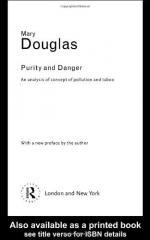
|
| Name: _________________________ | Period: ___________________ |
This test consists of 15 multiple choice questions and 5 short answer questions.
Multiple Choice Questions
1. Which group of people have practices to prevent and cure malaria?
(a) Dinka.
(b) Hencem.
(c) Sumerian.
(d) Christians.
2. For rituals to be effective, what does Douglas believe they require?
(a) Faith and confidence.
(b) Harmony and blessings.
(c) Symbolism and hope.
(d) Skill and health.
3. Primitive ideas of which item have various symbolic meanings, due to Douglas' claims?
(a) Grass.
(b) Urine.
(c) Dirt.
(d) Vegetables.
4. In modern societies, how does Douglas believe that wealth distributed?
(a) Market considerations.
(b) Social pollution.
(c) Unitiy.
(d) Role specializations.
5. Which of the following is not a social control that Douglas lists?
(a) Norms.
(b) Etiquette.
(c) License.
(d) Cell phone.
6. What does Douglas believe has been assumed to be based on false beliefs in magic?
(a) Purity.
(b) Christianity.
(c) Ethics.
(d) Comparative religion.
7. What does order reject, according to Chapter 2?
(a) Patterns.
(b) Purity.
(c) Aid.
(d) Dirt.
8. What does Douglas say primitive cultures represent more than modern cultures?
(a) Purity.
(b) Fragmented rules.
(c) Rituals and rites.
(d) Pattern rules.
9. Which type of myths incorporated undifferentiated conditions that provided a unified view of the world, stated by Douglas?
(a) Greek.
(b) Roman.
(c) Sumerian.
(d) Indian.
10. Why do cultures avoid pollution, according to Purity and Danger?
(a) It eliminates harmony.
(b) It creates danger.
(c) I creates disorder.
(d) It harms children.
11. Which of the following is an example of Douglas' social control?
(a) Television.
(b) Books.
(c) Cars.
(d) Passport.
12. When comparing culture, what does Douglas believe should be analyzed through the nature of historical process?
(a) Alignment and purity.
(b) Rationale and logic.
(c) Unity and variety.
(d) Pollution and society.
13. Which of the following serves as Douglas' distinction between primitive and modern culture?
(a) Religion.
(b) Cosmic pollution.
(c) Social pollution.
(d) Observing taboo.
14. Which of the following are a part of primitive views, according to Douglas?
(a) Solely pollution.
(b) Symbols nobody can decipher now.
(c) Solely mechanical symbols.
(d) Ethics.
15. Douglas states that all of the following can help to achieve purity except for what?
(a) Boundaries are established.
(b) Ideas are ordered.
(c) Two categories of animals must be eaten with each meal.
(d) Margins are kept according to rituals of separation.
Short Answer Questions
1. What are the only types of ideas that Douglas believes should be adopted?
2. To study purity and pollution, what does Douglas believe one must understand?
3. According to Douglas, rituals help to focus through what?
4. Who does Douglas claim found opposition between sacred and profane?
5. Which of the following does Douglas believe can disrupt schematizing?
|
This section contains 387 words (approx. 2 pages at 300 words per page) |

|




